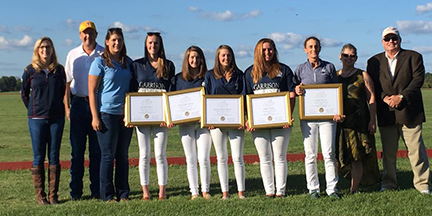From the MHC Government Relations Committee (first published in the July 2022 Equiery)
Working Student? Intern? Apprentice? What’s the Difference?
“It’s summer! And summer means riding camps, expanded lesson programs, guided trail rides – and lots of shows and competitions. In order to meet the demand, horse farm owners often rely on some combination of interns, apprentices and “working students”–the latter being a term unique to the equine industry that youth or adults who perform labor and are compensated with lessons or horse boarding or some other combination of perqs.” – Crystal Brumme Pickett
Do the terms really matter? Below is a handy primer, courtesy of the University of Maryland College of Agriculture & Natural Resources.
Maryland Farm Internships, Apprenticeships & Labor Laws
By Sarah Everhart
Many farms across Maryland use interns or apprentices to lighten the overall farm workload and help young people gain practical farming knowledge. The compensation of farm interns varies but what is the legality of these arrangements? Can interns work for free or be provided a small stipend? Or must they be paid minimum wage? What about an unpaid internship if meals, housing, lessons, boarding of a horse or other benefits are provided? When and how can interns be treated differently than other employees? There have been recent legal crackdowns on the compensation of interns and this is an area of the law, which can be costly if ignored or misunderstood.
Interns and Apprentices
The U.S. Department of Labor (DOL) has specific definitions of both internships and apprenticeships. The Maryland Department of Labor and Licensing (DLLR) administers the Federal program of regulation and registration of apprenticeship programs, and the bar for having a registered apprenticeship is quite high.
Therefore, a farm owner cannot simply designate a position on a farm as an apprenticeship and pay or otherwise treat the person in the position differently than the average employee unless the apprenticeship is properly registered with the State and Federal government.
As for interns, DOL has established a legal test called the primary beneficiary test to define an internship that can be compensated at less than minimum wage. The primary beneficiary test allows courts to examine the “economic reality” of the intern-employer relationship to determine which party is the “primary beneficiary” of the relationship. In Maryland, students in DLLR approved work-study programs may be paid less than the minimum wage. Compensating an intern less than the minimum wage is the exception rather than the rule. Therefore, a farm owner should consult DLLR before deciding to pay an intern anything less than minimum wage.
Minimum Wage
The amount of money which must be paid to those who work on your farm is set by the Federal Fair Labor Standards Act (FLSA), by a similar state law called the Maryland Wage and Hour Law, and in some cases, by county laws which set a higher minimum wage than state law. These laws set the minimum hourly pay rate which interns and other employees must be paid. The higher state or county minimum wage is the wage that must be paid to all employees. Importantly, workers cannot waive their right to be paid minimum wage. A farm owner claiming the intern knew and accepted an unpaid or under-paid internship does not have a viable defense.
There are exemptions for paying minimum wage to farm workers, most of which will not apply to equine-based businesses; to see the summary of exemptions, see https://www.agrisk.umd.edu/post/maryland-farm-internship-and-labor-laws?lang=en)
Other Forms of Compensation
Discuss with your tax, legal and insurance professionals if your working students or interns (adults or youth) are receiving any services, such as lessons, board for a horse, room and board for themselves), as there are tax and insurance implications involved – and possible penalties if you fail to comply.
Worker’s Compensation and Unemployment Insurance
If a farm has at least three full-time employees or an annual payroll of at least $15,000 for full-time employees, then the farmer is subject to Maryland’s Worker Compensation Insurance law. Employers should check with their insurance agents and make sure that interns, apprentices and/or working students are covered either through worker compensation or through the farm’s liability policy. Depending on the nature of the work performed, interns can “fall through the cracks” of insurance and it may be worth it to purchase worker compensation even if not required by law. Further, if a farmer pays wages of at least $20,000 to employees for agricultural work or employs at least 10 individuals in a period of 20 weeks in the current or preceding calendar year, the employer must also participate in the Maryland Unemployment Insurance program.
Conclusion
Although interns and working students can be a welcome addition to a farm’s workforce, farm owners need to be aware of how to properly compensate interns and the legal consequences of adding them to the payroll. Before a horse farm owner decides to hire interns or working students, the decision should be carefully considered and then reviewed by the employer’s insurance agent and attorney to reduce the exposure to liability, and with farm’s accountant to ensure compliance with tax codes.
Condensed and adapted version of article shared with permission from the author and the University of Maryland College of Agriculture & Natural Resources. To read original version, visit https://www.agrisk.umd.edu/post/maryland-farm-internship-and-labor-laws?lang=en
More Helpful Information from The Equiery’s Archives!
When is an intern an intern?
The U.S. Department of Labor has established this flexible test (no single factor is determinative) to define an internship which can be compensated at less than minimum wage:
1. The extent to which the intern and the employer clearly understand that there is no expectation of compensation. Any promise of compensation, express or implied, suggests that the intern is an employee- and vice versa.
2. The extent to which the internship provides training that would be similar to that which would be given in an education environment, including the clinical and other hands-on training provided by educational institutions.
3. The extent to which the internship is tied to the intern’s formal education program by integrated coursework or the receipt of academic credit.
4. The extent to which the internship accommodates the intern’s academic commitments by corresponding to the academic calendar.
5. The extent to which the internship duration is limited to the period in which the internship in which the internship provides the intern with beneficial learning.
6. The extent to which the intern’s work complements, rather than displaces, the work of paid employees while providing significant educational benefits to the intern.
7. The extent to which the intern and the employer understand that the internship is conducted without entitlement to a paid job at the conclusion of the internship.
ADDITIONAL RESOURCES
• Youth Apprenticeship – Maryland Apprenticeship and Training Program (MATP) – https://www.dllr.state.md.us/employment/appr/youthappr.shtml
• Maryland Apprenticeship and Training Program (MATP) – Division of Workforce Development and Adult Learning – https://www.dllr.state.md.us/employment/appr/












